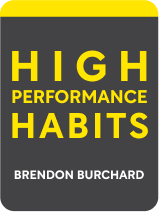

This article is an excerpt from the Shortform book guide to "High Performance Habits" by Brendon Burchard. Shortform has the world's best summaries and analyses of books you should be reading.
Like this article? Sign up for a free trial here .
Do you feel like your life lacks fulfillment and purpose? Do you try to seek clarity but don’t know where to start?
According to Brendon Burchard, clarity isn’t something that emerges on its own. You need to purposefully seek clarity about what you want out of life through reflection and experimentation.
Keep reading for Brendon Burchard’s advice on how to seek clarity about the goals and values that will define your life.
Two Levels of Clarity
To find fulfillment in your life, seek clarity about who you are and what you want. There are two levels of clarity—identity and future:
- Identity: Clarifying who you are helps you define your core values and the things that bring you fulfillment. Discovering who you are is the first step on the road to clarity.
2. Future: Clarifying what you want helps you create clear, actionable goals towards an overarching objective. You can’t clarify your future until you’ve found your identity. If you don’t know the values that drive you, you won’t know what you want to achieve.
How to Seek Clarity Through Reflection
To seek clarity in your life: reflect on the “Future Four,” identify the feelings you’re seeking, and determine what’s significant.
The Future Four
To find fulfillment, you need to seek clarity in four areas of your life: self, social, skills, and service.
Self: Seek clarity about the goals you find meaningful and want to strive towards. Once you define your goals, visualize your future self and begin to integrate the characteristics from that image into your daily life.
Social: Get clear on the relationships you want to foster, and what impression you want to make on the people around you. Visualize the direction you want your relationships to develop, then begin to implement aspects of that imagined relationship into your daily interactions.
Skills: Identify the skills you need to develop in order to advance in your field. Be specific and schedule time to develop these skills.
Service: Think about the difference you want to make in the world around you.
- Relevance: Know what matters to your client and what doesn’t. Prioritize your work based on the needs of your client.
- Differentiation: Know what makes your services unique and focus on the value you bring to the table.
- Excellence: Go above and beyond and provide a service that exceeds expectations.
Identify the Feelings You’re Seeking
Emotions and feelings are different. Emotions are an instinctive response to a trigger, where feelings are your interpretation of any emotion. For example, if an employee is late for the fourth time in a row, your immediate emotion may be anger. However, if you take a moment to make yourself feel calm, you’ll come into the situation more level-headed.
In any situation, take a moment to think, “What feeling am I bringing into this situation, and what feeling do I want to receive?” Dictating your feelings helps you handle your emotional responses. When negative emotions come to the surface, try to channel that energy into a positive feeling, using your body’s natural responses to deal with a high-intensity situation.
For example, an athlete may experience anxiety right before an important match. However, they can take that emotion and channel it into the feeling of excitement. They then go into the match grounded and prepared, knowing that they want to leave with the feeling of accomplishment.
Determine What’s Purposeful
People who live fulfilling lives spend their time investing in purposeful things and avoid the trials that don’t hold any meaning for them. For example, if you’re passionate about fitness, training for a marathon would be worth your time. While other challenges such as learning to cook or building a computer may be interesting, they aren’t meaningful in your life and, therefore, shouldn’t be focused on.
There are four elements of purpose—enthusiasm, connection, satisfaction, and coherence.
- Enthusiasm: When you’re enthusiastic about the work that you’re doing, challenges feel more fulfilling.
- Connection: Social isolation often leads to a lack of purpose. Surround yourself with people who will challenge you and push you to grow.
- Satisfaction: Satisfaction is made up of three factors: passion, growth, and contribution. If a challenge consists of all three of these factors, you’ll likely get satisfaction from working on it.
- Coherence: When thinking about starting a challenge, think about how it aligns with your long-term goals. For example, if your long-term goal is to have your own art gallery, investing in courses in art history, color theory, and medium technique would be sensible challenges to invest your time in.

———End of Preview———
Like what you just read? Read the rest of the world's best book summary and analysis of Brendon Burchard's "High Performance Habits" at Shortform .
Here's what you'll find in our full High Performance Habits summary :
- The 6 habits that high performers have
- How being a high performer is about more than one big achievement
- The 3 traps that can foil you, even if you're a high performer






